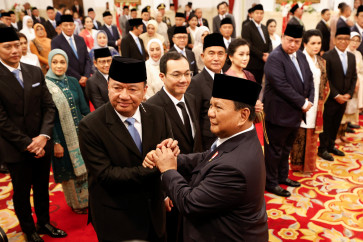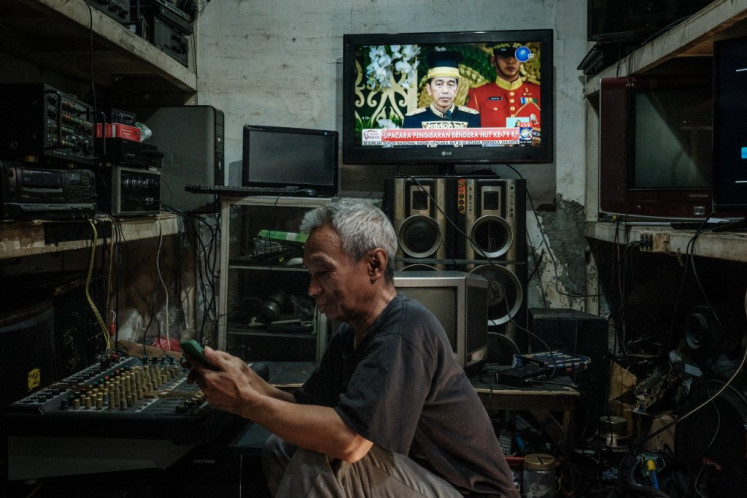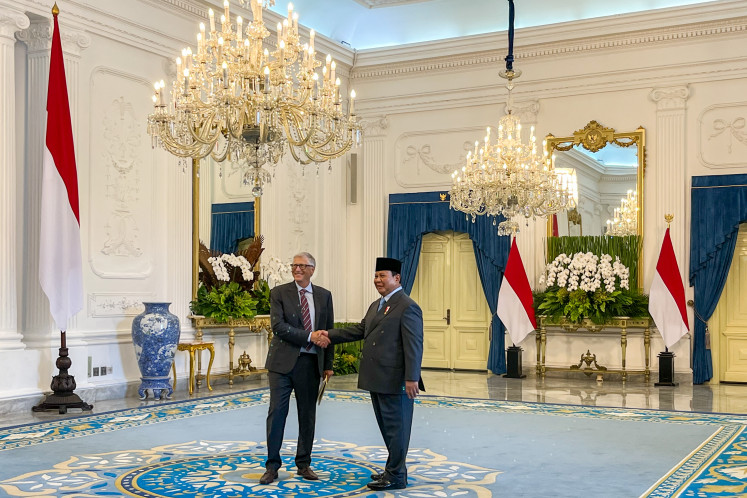Biennale Jogja rejects commercialism
The Biennale Jogja X 2009 kicked off over the weekend, pledging to steer from possible commercialism by, among others, not trading the exhibited works of arts, the event’s director Butet Kartaredjasa said
Change text size
Gift Premium Articles
to Anyone

T
he Biennale Jogja X 2009 kicked off over the weekend, pledging to steer from possible commercialism by, among others, not trading the exhibited works of arts, the event’s director Butet Kartaredjasa said.
Speaking at the opening ceremony at the Yogyakarta Cultural Center (TBY), Butet said the
pledge to strengthen the country’s oldest biennale, allowing creativity to prosper.
“This is not about the arrogance of an artist,” Butet, a noted monologue performer, said.
Butet also expressed concern that people misinterpreted culture as dead and a commodity. He regretted that the quality and creativity of culture was calculated. “This is concerning,” he said.
“There is nothing wrong with commercializing culture, but only if culture is treated fairly and seen as a thinking dialectic that always grows,” he added.
More than 200 artists and sculptors will participate at the Biennale Jogja X 2009, with “Jogja Jamming, Seni Agawe Santosa” (Jogja Jamming, Arts Creates Strength) as its central theme.
They are divided into 126 artists and six arts clubs that will exhibit their work at the four main venues of the biennale, the TBY on Jl. Sriwedani, the Jogja National Museum in Gampingan, the Sangkring Art Space in Nitiprayan and Bank Indonesia Yogyakarta building on Jl. Panembahan Senopati.
Other participants include 197 art communities whose outdoor artworks are displayed in about
200 locations in public spaces across the ancient city of Yogyakarta, including the legendary street Jl. Malioboro and other streets such as Jl. Ahmad Yani, Jl. Panembahan Senopati, Jl. Kusumanegara and Jl. KHA Dahlan.
A night market marked the official opening of the event by Culture and Tourism Minister Jero Wacik. A music performance by Jaduk Ferianto’s Kua Etnika group, a contemporary trance-dance performance jathilan, a Balinese ogoh-ogoh dance and a performing arts performance involving 20 female laborers fromthe Yogyakarta traditional market Beringharjo, was performed at its opening.
The Biennale Jogja was first held in 1988 and was initially named the Painting Art Biennale. It was then changed to the Fine Art Biennale.
“Because of demand and to accommodate a wide range of cultural performance, the festival’s name was changed to the Biennale Jogja in 2003,” Butet said.
Butet also said it was worth noting this year’s biennale included a team tasked with preparing a
permanent biennale institution to manage the organization of the Biennale Jogja, with support
from the provincial budget and the governor.
“This permanent institution will not just organize the Biennale Jogja, but develop strategies, work on finance and strengthen fine art in Yogyakarta,” Butet said, adding that the development team was scheduled to finish their task by April next year.
In remark, Minister Jero Wacik expressed appreciation that Yogyakarta fostered the arts.
“Today we had an important ministerial meeting with governors from across Indonesia in Jakarta.
“However, I asked for Yudhoyono’s permission to come here for this event,” he said, saying that the government’s appreciation of Yogyakarta arts was high.
He added when he was asked by Yudhoyono to be his culture and tourism minister, the President
told him that tourism was important as it provided the country with income. But Yudhoyono said culture was more important because a nation could carve its identity through culture.
“That is the importance of culture,” Butet said. “It cannot be compared with tourism, which is mainly finance-orientated,” he added.









